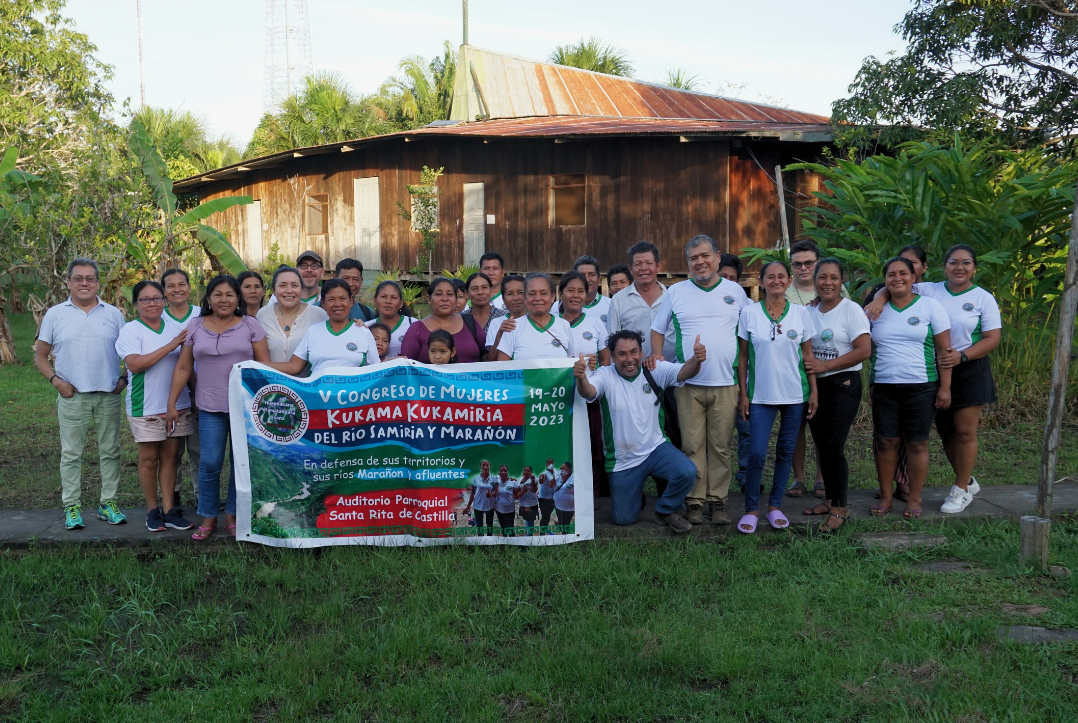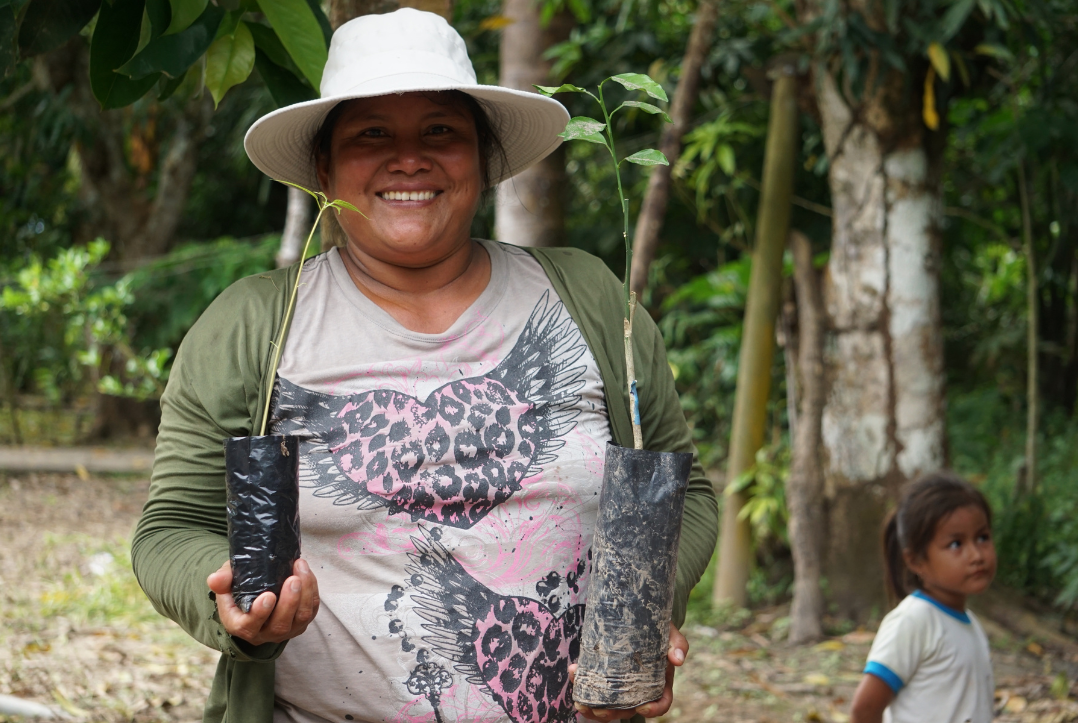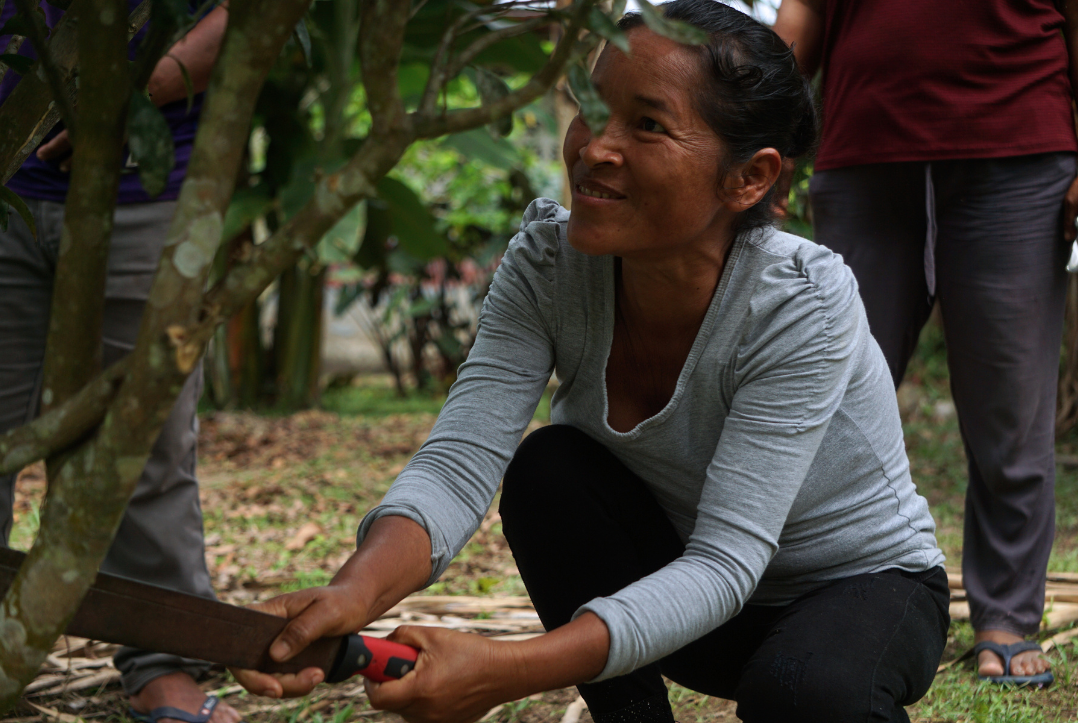In 2022, after years of supporting neighboring communities of our Permaculture Center to install agroforestry plots to recover and promote traditional Amazonian agroforestry practices, we began to make efforts to take our agroforestry outreach work to indigenous communities. This has been a long process that started with mutual learning spaces and exchange experiences with indigenous representatives over the years. Dialogues of knowledge, workshops and trainings that were the basis of what we are doing now.

This year, our work took on a specific focus that puts the empowerment of indigenous women and the visualization of their key role in relation to family farming at the center. We have strengthened our partnership with Kukama women so that they are the ones leading this work in their communities.
Gilda, Celia, Juanita and Adilia are Kukama women from the Marañón river and belong to the communities of Parinari, San Juan, Tangarana and Shapajilla, respectively. They are all part of the Huaynakana Kamatahuara Kana organization and participate in the organization's fight to defend their rights and territories, especially from the damages caused by extractive industries. The continuous oil spills they have suffered - and continue to suffer - have for decades contaminated the food sources on which these communities depend on. In most cases, rivers and rainfall are their only sources of water.

In addition to the mentioned above, the severe loss of Kukama culture and identity, the contact with Western society and the changes in the economic dynamics of the communities, among others, have resulted in the loss of much of their traditional knowledge. This includes their ancestral practices of forest agriculture, which has had a negative impact on their food security, how they use the resources of their environment and their relationship with nature.
As part of our project "Regenerative Agroforestry, Recovery of Indigenous Forest Agriculture and Food Sovereignty in the Peruvian Amazon", we have committed ourselves to contribute to reverse this situation with a proposal that is based on the dialogue between indigenous and technical-scientific knowledge. This is the continuation of the first pilot agroforestry plots that we supported to install in two indigenous communities last year with the aim to contribute to improve the food sovereignty of these communities, so that families can generate additional income, as well as restore degraded areas of the rainforest and thereby mitigate climate change.

In May, we received Gilda, Celia, Juanita and Adilia at our permaculture center for a week in order to deepen the knowledge necessary to allow them to be the promoters that lead the installation of nurseries in their communities. As promoters, they are responsible not only to replicate what they have learned, but also support the families they work with in this process. The nurseries installed will later serve to add diversity to family chacras or install agroforestry plots in their communities.
For Adilia, from the community of Shapajilla, being a farmer is part of her identity, "I am a farmer, I like to plant, I work on the chacra, I raise my chickens". In her community there is a lot of interest in citrus fruit trees, which are valued both as a source of food and for their ability to generate income. In a recent visit that our team made to their community, we reinforced their knowledge on how to germinate seeds and graft citrus trees, with the goal that they develop the skills to continue doing this work in the future.
The progress they have been making in their communities has already motivated more people to join the project, which is already happening in the community of Nuevo San Juan where Celia lives, "a person who was not part of the project is also motivated and is participating now because he wants to learn". In this community, Celia has found in the role of promoter an activity that she enjoys, "I like to take time to talk with the families, going to their farms, ask if their seeds are growing or not. As they say, in life you have to be able to be and do everything". After the workshop she returned to her community feeling motivated, "I was eager to apply what we learned there, the grafting, the pruning. I went to my father's orchard and pruned some citrus trees".

The motivation they have is also spreading to their community. Gilda, in Parinari, has also been able to witness this, "I am practicing what I have learned in the workshop, I have already made my nursery for my seedlings. Also my biol [an organic fertilizer] to see the improvement of the fruits. For me it is great, I am working here with my people, I have talked to them a lot and I have also seen the interest they have". The families she works with have already begun to take their first steps, "I feel that they are taking it seriously, they want to plant, they want to take care of it. I see that they are responsible, some of them are already building their chacras".
Juanita, on her part, holds the position of "indigenous woman" in the Tangarana community. Although she would have liked to learn all this when she was younger, she feels the fulfillment of doing this work now, "what I have not done when I was younger I am doing at this age, but I am not yet so old [laughs]". Her main motivation is the future generations of her community, "I tell everyone this, don't think only for yourself... because, as it is said, nothing in life is guaranteed, but our work will remain sown [...] Someday my grandchildren will harvest and be able to say 'this was planted by my grandmother'".

This concern for the future is something they have in common. As indigenous women, they play a fundamental role in caring for the biodiversity and resources of their territory. Their place in family agriculture makes them key actors for achieving greater food sovereignty. These women are also the ones who will transmit their knowledge to the next generations. In Celia's words, "that is the future, that the younger ones also focus on this type of project of planting, reforesting".

We are grateful for their strength and perseverance to allow us to keep pushing forward, and we are proud to have them as our allies.
--
Since our foundation, we have been bridging traditional indigenous land management techniques with modern permaculture methods to recover and promote healthy and regenerative ways to interact with the environment. Your support is key to our work! To support our agroforestry work with indigenous kukama communities click here.

